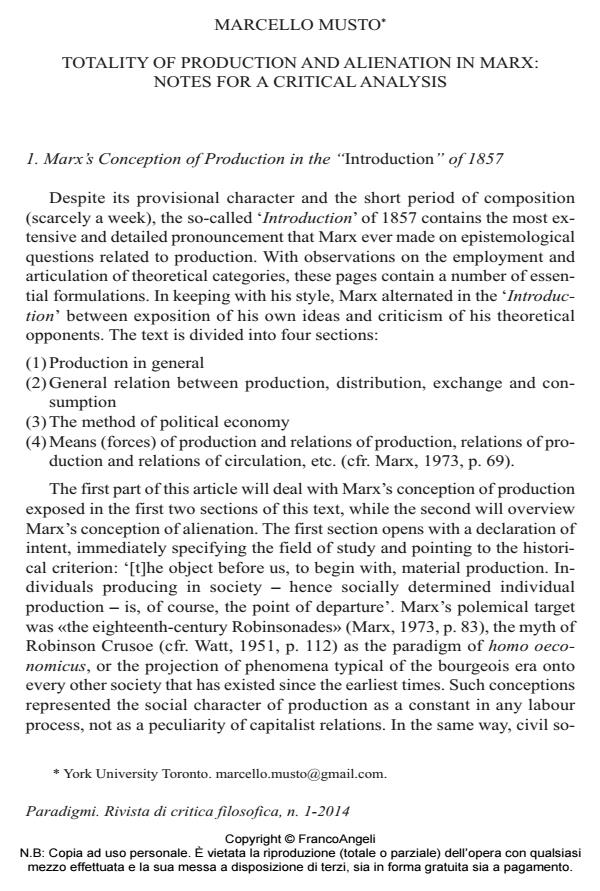Totality of Production and Alienation in Marx: Notes for a Critical Analysis
Journal title PARADIGMI
Author/s Marcello Musto
Publishing Year 2014 Issue 2014/1 Language Italian
Pages 22 P. 89-110 File size 537 KB
DOI 10.3280/PARA2014-001006
DOI is like a bar code for intellectual property: to have more infomation
click here
Below, you can see the article first page
If you want to buy this article in PDF format, you can do it, following the instructions to buy download credits

FrancoAngeli is member of Publishers International Linking Association, Inc (PILA), a not-for-profit association which run the CrossRef service enabling links to and from online scholarly content.
The ‘Introduction of 1857’ to the Grundrisse is the most extensive and detailed pronouncement that Marx ever made on epistemological questions and it is an important reference for the understanding of his conception of "production". Beginning in the 1960s, the diffusion of the Grundrisse paved the way for a conception of alienation different from the one then hegemonic in sociology and psychology. It was a conception geared to the overcoming of alienation in practice - to the political action of social movements, parties and trade unions to change the working and living conditions of the working class. The publication of what may be thought of as the ‘second generation’ of Marx’s writings on alienation provided not only a coherent theoretical basis for new studies of alienation, but above all an anti-capitalist ideological platform for the extraordinary political and social movement that exploded in the world during those years.
Keywords: Alienation, economy, production, Grundrisse, fetishism, Capital.
- Hall S. (2003). Marx’s notes on method: A “reading” of the “1857 Introduction”. Cultural Studies, 17, 2: 113-49. DOI: 10.1080/095023803200011486
- Hegel G.F.W. (1892). The Logic of Hegel [Encyclopedia of the Philosophical Sciences ]. II ed., London: Oxford University Press.
- Hegel G.F.W. (1969). Science of Logic. London: George Allen & Unwin.
- Marx K. (1973). Grundrisse: Foundations of the Critique of Political Economy (Rough Draft). Harmondsworth: Penguin Books.
- Marx K. (1976). Results of the Immediate Process of Production. In: Capital, vol. I. London: Penguin: 941-1084.
- Marx K. (1977). Wage Labour and Capital. In: Marx-Engels Collected Works, vol. 9. New York: International Publishers: 197-228.
- Marx K. (1986). Exzerpte aus James Steuart: An inquiry into the principles of political economy. In: Marx Engels Gesamtausgabe (MEGA2), vol. IV/8: Karl Marx Exzerpte und Notizen März bis Juni 1851. Berlin: Dietz Verlag: 304, 312-25, 332-49, 373-80, 400-1, 405-8, 429-45.
- Marx K. (1987). Original Text of the Second and the Beginning of the Third Chapter of A Contribution to the Critique of Political Economy. In: Marx and Engels Collected Works, vol. 29: Marx 1857-61. Moscow: Progress Publishers: 430-510.
- Marx K. (1992a). Economic and Philosophical Manuscripts (1844). In Marx K.: Early Writings. London: Penguin: 279-400.
- Marx K. (1992b). Excerpts from James Mill’s Elements of Political Economy. In Marx K.: Early Writings. London: Penguin: 259-278.
- Marx K. (1996). Capital, vol. I. In: Marx and Engels Collected Works, vol. 35: Capital , vol. I. New York: International Publishers.
- Marx K. (1998). Capital, vol. III. In Marx Engels Collected Works, vol. 37: Capital, vol. III. New York: International Publishers. Mill J.S. (1965). Principles of Political Economy, vol. I. London: Routledge & Kegan Paul.
- Ollman B. (1971). Alienation. New York: Cambridge University Press.
- Ricardo D. (1973). The Principles of Political Economy and Taxation. London: J.M. Dent & Sons.
- Schaff A. (1980). Alienation as a Social Phenomenon. Oxford: Pergamon Press.
- Smith A. (1961). The Wealth of Nations, vol. 1. London: Methuen.
- Spinoza B. (1955). Letter to Jarig Jellis, 2 June 1674. In: On the Improvement of the Understanding and other works. New York: Dover.
- Watt I. (1951). Robinson Crusoe as a Myth. Essays in Criticism, I, 2: 95-119.
Marcello Musto, Totality of production and alienation in Marx: notes for a critical analysis in "PARADIGMI" 1/2014, pp 89-110, DOI: 10.3280/PARA2014-001006